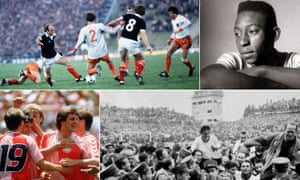1954
The Miracle of Bern. Germany weren’t meant to get very far. German players were all still technically amateurs. Hungary were the Goliaths of world football, having gone undefeated for four years, including beating England – the self-ascribed “inventors of football” – 6-3 the year before and 7–1 just before the World Cup. Hungary beat Germany 8-3 in the round robin, so no one expected Germany to have a chance in the final. Removable cleats were used for the first time, which may have helped in a torrential downpour durijng the final. They made a movie of it. It was Germany’s first World Cup win and it revived the nation after the second world war. It also launched German football on a successful path for the years to come. A Germany fan
1958
The Swedish spectators applauded Brazil’s team as much as the home team during the final. Pelé had become a world star and the sportsmanship from the fans is something we will never see again in a World Cup final. Per Zettergren
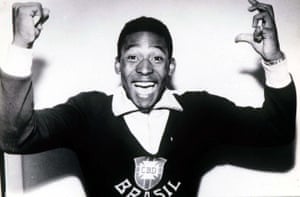
1966
I was caught up in the excitement of a home tournament as an 11-year-old from Ipswich. Alf Ramsey had taken the England job after working miracles with the Town so, of all places, we knew England were capable of going all the way. My first sticker album introduced unknown names and mysterious countries. North Korea? Did they even play football. The realisation took hold that we had created a game that the whole world embraced. South Americans were spoken of in awe.
As the tournament progressed my parents informed me our cousin had arranged to get married on the afternoon of the final. Devastation. I would be fated to miss watching our greatest achievement. I’m thankful for the BBC radio commentary, which I listened to outside the wedding reception in our car. I’ve been waiting ever since for the opportunity to see us repeat the feat. The only other time we have come close is with a former Ipswich manager so, in eight years’ time, I expect Paul Hurst’s boys to lift the trophy. You read it here first. Andrew Dobson
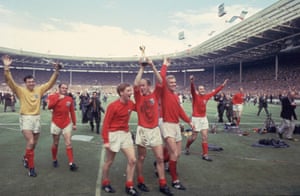
The drama of football fell out of the sky when the BBC brought its black and white pictures of so many games into our living rooms at a time when matches were rarely broadcast. Having the tournament in England and the building excitement caused by the home team’s progress combined to make this World Cup a parting-of-the-clouds “hallelujah” moment that changed the rest of my life. From Pelé limping off to the South Koreans’ spirit from Antonio Rattín’s red card to Eusébio’s goals, from Bobby Charlton’s Mexico rocket to Geoff Hurst’s controversial goal in extra time, it had a hook to capture every emotion and enough brilliance to draw an impressionable child to football’s flame forever. John Daykin
1970
I’m 61, English and I remember 1966, but Mexico 70 was simply the best. Why? Brazil, of course. Pelé, Tostão, Jairzinho, Rivellino, Gerson, Carlos Alberto, Felix, Edu; even now I can remember their names. When we went out to re-enact the games in the street, we were always Brazil, never England. (I was Tostão). In retrospect I wish I’d paid more attention to England. I didn’t know it would be our last appearance in a World Cup until 1982! The Brazil v England game gave us three iconic moments: Banks’s save, Moore’s tackle and the picture of Moore and Pelé swapping shirts afterwards. It was the best World Cup of all time won by the best team of all time. Sigh. Tim Vince
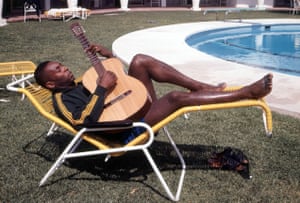
I was on holiday in Italy and my dad took me, then aged seven, to a hotel bar in Rome to watch England v Brazil on a back-and-white TV. I stood on a chair, surrounded by Italians who were supporting Brazil, with just a sole Canadian supporting England with us. We were back home for the quarter-final against Brazil. At 2-0, the tension got too much and I had to go to my bedroom. My sister brought me the bad news. It is still the last time I cried due to a football result. Then Brazil in the final: magnificent! No longer Moore or Charlton, the whole of my primary school wanted to be Jairzinho or Pelé in the playground – not bad for Essex in 1970. An England fan
1974
Even though 1982 had my favourite ever match – the Brazil v Italy shocker – I always remember 1974 for the total football played by the sophisticated Dutch. What a team! Johan Neeskens, Ruud Krol, Rob Rensenbrink, Johnny Rep and the majestic Johan Cruyff. I still remember being awestruck when witnessing the famous Cruyff turn, an act that, if it had occurred in medieval England, would have had him burned as a witch. After a diet of English Division One football, watching this Holland team was like going to eat at a Michelin-starred restaurant after a year eating at a Little Chef. Naturally, Germany spoiled the party by beating them in the final, but the reality is that everyone remembers the Dutch. Nick Goodey
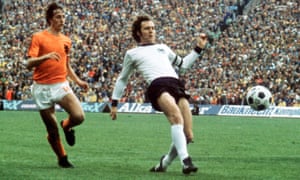
The 1974 World Cup is absolutely my favourite. We saw two top European teams reaching the peak of their powers: West Germany and, of course, Holland. Their trajectories were opposite. Holland played effortless, beautiful total football in the early stages but lost their way in that famous final where they scored before the Germans had even touched the ball. But the legacy of total football is still alive and kicking. We saw Europe’s greatest player of all time, Johan Cruyff, showing his magic. And Germany had two world-class players: Franz Beckenbauer leading the team as the libero and the devastating Der Bomber, Gerd Müller, scoring the goals – including the winner in the final. Germany started the tournament poorly but they were alert when the moment of truth came. Both teams set the standards that still haunt modern football. They understood both how to defend as one and strike in unity. And they gave a 14-year-old schoolboy great memories. A fan from Finland
1978
My first, but everything about it was magical: the Argentinian welcome, the long-range shooting, Kempes, Rensenbrink, Boniek, the classic Italy v Argentina game and, of course, Archie Gemill’s wondergoal amid the tragicomic Ally’s Army campaign. Players weren’t as ubiquitous then; you didn’t see the best players every week in the Premier League or Europe. It all felt a bit more exotic, unpredictable and exciting. I loved that Argentina side too. Rory
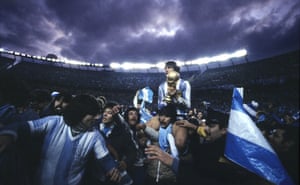
I was 17, the perfect age. All the games were in the evening, which made for easy viewing. And South America was still somewhat exotic in those days. The football was great and every game seemed to be important and well contested. Even though I’m English, I supported Scotland because they had King Kenny, but it became historically funny when Ally and his army imploded – although their game against Holland was such a great one. Leopoldo Luque and Mario Kempes were superb and there were countless great goals from at least 40 yards. It has never been equaled. Alan Norris
1982
I was 10 years old and a World Cup newbie. Goodness me, that tournament did not disappoint: Gerry Armstrong against Spain, Paolo Rossi throughout, David Narey against Brazil, Bryan Robson’s 27-second goal against France, the last great Poland team, the French midfield of Tigana, Giresse and Platini, the wonderful Brazil team featuring Zico, Socrates, Eder and Falcao – still the best side to grace a World Cup – and perhaps the best two World Cup games in Italy v Brazil and West Germany v France. It had it all and it also instilled in me early on that it’s not always the most entertaining or best team that finishes on top of the pile – and that England never win anything. Paul Stoddart
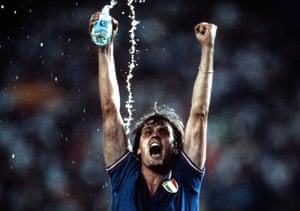
Spain 82 is the first I really remember and every World Cup since has failed to live up to it. Coming home from school for the tea-time games and staying up late to watch evening games; seeing my Italian father’s emotions change from disgust to elation within three weeks; the magic of that Brazil team; England not losing a game but still somehow underwhelming; the resurrection of Italy; the stink of Germany v Austria; Schumacher v Battiston; Narey’s goal against Brazil; Robson’s effort against France; a group containing Brazil, Argentina and Italy; Hungary winning 10-1; Gaspar Gentile’s balletic hatchet job on Maradona; the epic West Germany v France semi-final; Kuwaiti walking off the pitch; and, of course, Marco Tardelli and the scream that never ends. A fan from the UK
1986
As an eight-year-old, it was my first foray into football. Every goal was a belter: Negrete, Josimar, Maradona to name but a few. The theme music from ITV, apart from Nessun Dorma in 1990, is the only World Cup music I remember. Things just stick out: a Titanic battle between France and Brazil, Graeme Souness almost falling over in the heat, Jimmy Hill yelling during Gary Lineker’s hat-trick, Maradona’s genius and Hand of God, Denmark’s free-flowing football. Watching the final on a black-and-white portable TV in a caravan in Scarborough through a thick snowy screen while covered up suffering from sunstroke. It’s the memories that make it and I have more from that World Cup than any other. Daffel
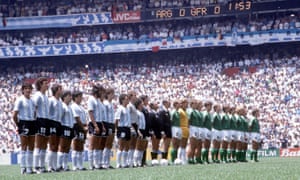
Mexico 1986 caught me at just the right age. That World Cup was filled with iconic teams and players, and this was before the expansion of Uefa club competitions brought them all into your home every year. Teams played with the desire to attack and win before were outlawed in favour of cagey don’t-lose tactics in 1990. Players such as Laudrup, Elkjaer, Maradona, Littbarski and Platini made your mouth water at the prospect of their outrageous technical ability and the vision to make special moments happen.
The magnificent TV title sequences, the magical Azteca ball and the exotic surroundings in Mexico added to the glamour of the tournament. As a kid I had never seen such a vast and colourful stadium as Mexico City. Factor in the last generation of great Scottish footballers in the original group of death and Mexico 86 will always have special memories for me: my first full international kits (Scotland and Denmark), my first fully competed Panini album, and the glory of Maradona leading his team to a deserved win against England, Belgium and Germany. Jake
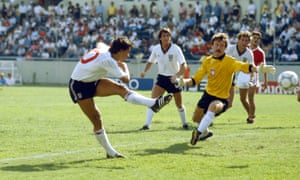
In the run-up to 1986, there was a lot of press coverage about stadiums not being fit for purpose and organisational chaos behind the scenes, but all of that stopped when the football began. I can’t recall a World Cup with so many high-drama, epic matches. In the group stages, we had the astounding performances of Denmark, particularly the 6-1 annihilation of Uruguay. There was also the high-energy attacking football of Valeriy Lobanovskyi’s USSR team and the silky brilliance of France, but the excitement levels really began to rise in the knockout rounds. Belgium exposed the defensive flaws of the USSR in a wild last-16 game where Igor Belanov scored a hat-trick but still ended up on the losing side; Spain demolished the fancied Danes 5-1; and Argentina beat Uruguay in a tense match that was played during an electrical thunderstorm. In the last eight, France and Brazil squared off in the blistering heat and produced a World Cup classic that went all the way to penalties.
The star was, of course, Maradona. In every game, the little Argentinian produced wonderful, world-class football. He scored a terrific individual effort against Italy and played brilliantly in the downpour against the Uruguayans, but it was in the quarter-final against England where he took charge, both of the tournament and his own destiny, and reinforced his claim to be considered one of the all-time greats. A similar outstanding performance and two more Maradona goals eliminated the Belgians in the semi-finals and, although he was a touch more subdued in the final, he still managed to produce the brilliant killer pass for Burruchaga’s late winner against West Germany. Charlie Maguire
1990
I was 15 years old, had just completed my GCSEs and, coming from an Anglo-Irish background, saw the whole family fully up for the Cup for the first time. We were swept along on a wave of Gazza’s tears, Big Jack putting ‘em under pressure, David O’Leary’s winning penalty and Platt scoring past the Belgium goalkeeper. Cameroon were great to watch, Schillaci was on fire for the hosts, Baggio bagged a beauty against the Czechs, and Matthäus scored one of the best ever World Cup goals against Yugoslavia in the group stages. 1990 also had the best tunes: the great anthem World in Motion and even Touched by the Hand of Cicciolina by Pop Will Eat Itself. Joe Meaney
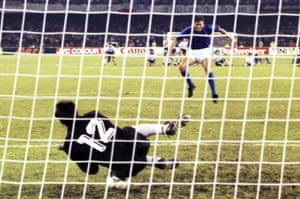
I don’t remember Italia 90 as being dull and dreary. As a nine-year-old watching my first World Cup, everything about the tournament was exciting. Countries from far away lands such as Cameroon; futuristic match graphics that have never been bettered; Roger Milla and Toto Schillaci; watching parts of Scotland v Brazil in a classroom when off-stage during a performance of the end-of-year school musical; and hiding in the hall of my gran’s house when West Germany scored in the final because I couldn’t watch the penalty as I was too excited. Chris McLaren
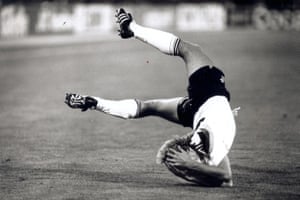
I’m from Italian descent so, as a nine-year-old, I was curious about anything Italian. For some reason our teacher ran a project about the World Cup at school. I went from a child who didn’t really care for football to becoming increasingly obsessed. I still remember staying up to watch Italy beat Uruguay, as well as Schillaci’s six goals and Baggio scoring against Czechoslovakia.
It also was the first time I had experienced crushing disappointment. I remember my mum having to console me to sleep after we were robbed in the semi-final – something all my other friends would experience the next day when England met the same fate. It also had the joyous Cameroon, a wonderful Germany team and some iconic England moments. I’m not sure there has ever been a more complete World Cup. It was also the first time I owned a Panini sticker album. Isaac Occhipinti
1994
It is the first one I remember, so there is obviously nostalgia there. However, there are so many wonderful memories: the high-scoring Romania, Bulgaria and Sweden teams, the team ethic from USA in their home tournament, and the tense final won by Brazil. Special mention to Ireland’s victory against Italy, Saeed Al-Owairan’s wondergoal and Diana Ross’s penalty miss. Luke Webb
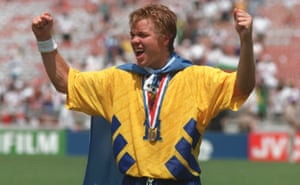
This tournament this still evokes a magical shimmer in the minds of a certain generation of Swedes. I was nine, the summer was long and warm, and a goal-happy Sweden managed to win a quite unlikely bronze medal and return home to a heroes’ welcome. The names, the music, even the end-of-the-year TV review of the tournament are all still legendary in Sweden. On top of that, it had plenty of goals and interesting storylines: Maradona’s fall from grace, Italy’s narrow road to the final, the Bulgarian upstarts and so on. The final was dull, but that does not overshadow the rest of the tournament. David
1998
Spain 82, Mexico 86 and Brazil 14 were all great, but France 98 is the one that stands out. Not only because my own country, the Netherlands, played their best tournament since 1974 – and they haven’t played as well since, not even when they reached the final in 2010 – but also because the whole tournament was just perfect: the atmosphere, the football, the weather (a World Cup needs to be in a warm country), the final, the winner. Johan van Slooten
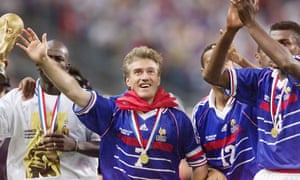
France 98 is the first World Cup I properly remember: the build-up, the Panini sticker album and the brilliant tournament itself. It ended in typically lacklustre fashion for England, but there were some incredible moments to treasure. Rushing home from school to watch Scotland open the tournament drenched in the late-afternoon shade of the Stade de France and almost take a point off mighty Brazil. Michael Owen’s goal against Argentina, David Beckham’s red card. Great players and great stadia all enjoyed with the advantage of ideal kick-off times. And then there’s the final. A football match for the ages. What had happened to Ronaldo: was he ill, would he play? Ultimately it didn’t matter because the mesmerising Zinedine Zidane gave one of the great individual performances. I loved football before this tournament and was utterly besotted with it by the end. Sean Ranson
2002
It had the perfect mix of underdog triumphs (Turkey and South Korea making the semis), glaring omissions (the Netherlands failing to qualify), shock implosions (reigning champions France getting absolutely leathered from all corners), improbable successes (Germany side making the final), heartbreak (the best England side in a generation going out fighting), and redemption (Ronaldo exorcising his demons and putting in the greatest shift in one tournament since Maradona). The planning and execution of what was at the time an incredibly bold decision to hold a World Cup across two countries separated by hundreds of miles of sea also deserves a thousand plaudits. 1998 had been my first World Cup, but this was the one where I truly fell in love. Philip Kent
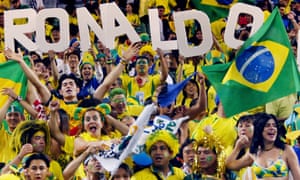
2002 was the first time I had total World Cup fever. I was the perfect age to still believe England could win it, as I hadn’t been worn down by that point yet. The locations were great, with the Japanese and South Koreans putting on such a good show; it had that beautiful ball; and it came at a time just before we knew everything about every player and teams could come along and totally surprise us.
My school had big screens so we could come and watch the early kick-offs, so we hung out with our friends for the games then went and recreated what we had seen at lunchtime on the field. It was also a tournament of genuine upsets; Brazil were back to their best; and the whole Senegal squad seemed to be bought by European clubs – can’t remember how that all turned out. Adam
2006
I was 13 at the time, so in that beautiful sweet spot in my football supporting life when I was old enough to understand what was going on but not so old to be cynical and depressed by it all. It was also probably the last ever World Cup in which international football was the pinnacle of the game. The summer of 2006 was impossibly hot; games were on at sociable hours in the UK; and everyone was drunk, all hours of the day, sunburnt and draped in St George’s flags.
I also measure football by the other sporting contexts at the time. I distinctly remember watching England v Trinidad and Tobago (where is that dad?) before watching England v Sri Lanka in a T20 and watching some young tennis player called Andy Murray beat Andy Roddick at Wimbledon after the crushing disappointment of the Portugal loss. Finally, 2006 had the crucial ingredient: glorious, unjust England failure. After Ronaldo’s wink to Rooney, I printed a photo of him and put in on my dart board. An incredibly pointless and petty move but it made feel better. George Potter
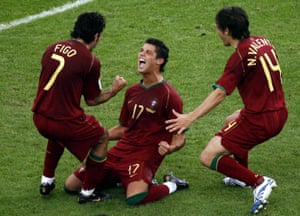
I was a second year undergraduate student during the summer of 2006 so was entirely free to watch the entire thing free of responsibility, but with plenty of drink. The opening game, Germany 4-2 Costa Rica, got thing off to a flyer and included screamers from Philip Lahm and Torsten Frings. There was the last-16 Battle of Nuremburg between the Netherlands and Portugal, which included four red cards and 16 yellows; let’s be honest, those are scenes we do want to see. It had Zidane’s Panenka and headbutt, Joe Cole’s volley against Sweden and it was the last time England won a knockout game – until 2018! The atmosphere was excellent and the ball didn’t behave like a penny floater. Paul Brown
2010
My extended family are from South Africa and the World Cup wasn’t shown on TV during the apartheid days of the 1980s, so my dad recorded some matches of the 1986 tournament and sent them over to my family in Johannesburg. I was seven at the time and still remember watching the final with my siblings, shouting out “YESSSS” when Jorge Burruchaga scored the winner. Fast forward 24 years and me and my brother ended up going to South Africa for the 2010 World Cup and re-watching those same recorded 1986 matches.
2010 was pretty poor from a footballing sense, but being there among people from all over the world was special. We were fortunate enough to watch 13 matches, from the boring Algeria v Slovenia in Polokwane, to seeing Lionel Messi up close against Nigeria and experiencing the sub-zero temperatures of Brazil v North Korea in Johannesburg. Topping them all, however, was the thrilling quarter-final between Uruguay and Ghana in Soccer City. Ishmail Chicktay
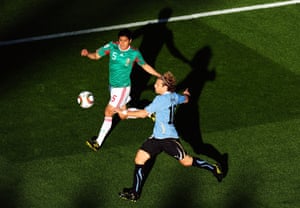
2010 has a bad reputation, but so many individual moments are ingrained in my memory. I will never forget the sheer elation of Serbia, the country where I was born, beating Germany. I had a GCSE exam at the same time as that game. I arrived home and asked my dad the score. “Serbia one, Germany nil.” I let out a blood-curdling scream. I’ve never jumped higher.
There are all the other little moments that make up my mosaic of memories: Siphiwe Tshabalala’s orgasmic opening goal; English commentators never failing to mention that Diego Forlán had “struggled at Manchester United” as he took on all-comers; the sheer hilarity of watching England flail against USA, bore everyone to death against Slovenia and Algeria, then get utterly demolished by Germany (I live in Wales). People forget that great Slovakia v Italy game, New Zealand’s undefeated status and that ridiculous run of penalties in Spain v Paraguay. There was Germany’s demolition of Argentina, Felipe Melo’s stupid stamp against the Netherlands, and Luis Suárez’s handball.
In fact, the more I remember it, the more I realise most of my defining memories of 2010 are of cack-handedness, stupidity and incompetency. And in a way, that’s beautiful. Football is just as much about Phil Babb running nuts-first into a goalpost as it is about Lionel Messi ghosting past five defenders. And 2010 had plenty of comical mishaps and moments of stupidity to make it worth it. Fedor Tot
2014
Recency bias be damned, 2014 is my favourite World Cup. I could try to build my case on the basis of objective data – the most goals per match of any of the last five World Cups – or by making a token reference to the historic levels of enthusiasm the tournament inspired in the US. But if I’m being honest, my preference is a mere side effect of personal circumstance. In the summer of 2014 I was single and unemployed. Now I can see the obvious connection between those two conditions, but at the time all I knew was that together they meant I had nothing better to do than drink and watch soccer.
Of course, I’ll always remember the conventionally unforgettable moments – the 7-1, the dolphin dive headers, the ejections for biting and so on – but, more than any of these, I cherish the memory of Bosnia 3-1 Iran, a weekday match played at 11:00am Los Angeles time. As I sat in a shadowy bar off Sunset Boulevard, drinking pre-mixed bloody marys and watching an entirely meaningless match between two teams that were eliminated from the competition, I felt immensely grateful for every questionable decision that had led me there. Charlie
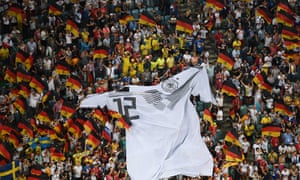
2014 was completely unpredictable. Spain had bulldozed every team for the previous six years then suddenly found themselves crashing out in the group stages. Costa Rica topped a group containing Uruguay, England and Italy. The worst Holland team in my lifetime reached the semi-finals. The cherry on the cake of course was Germany 7-1 Brazil. That’s a game I’ll be telling my grandkids about 50 years from now. Gabriel Sutherland


